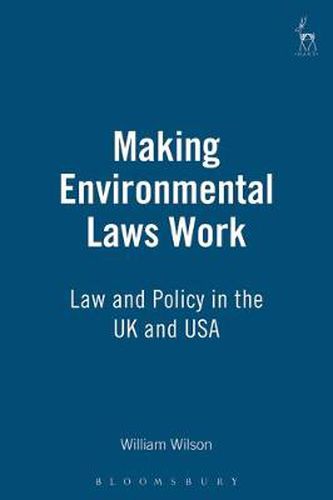Readings Newsletter
Become a Readings Member to make your shopping experience even easier.
Sign in or sign up for free!
You’re not far away from qualifying for FREE standard shipping within Australia
You’ve qualified for FREE standard shipping within Australia
The cart is loading…






This book explores ways in which ideas from America could be used to improve the effectiveness of environmental laws in Britain and throughout Europe. It addresses some of the wider issues which help to decide whether environmental laws are effective or not.
The book considers the political context in which environmental laws are made,and the implications for long-term public support of them. It examines the ways in which the law-making processes in Britain and Europe effectively exclude public participation and offers suggestions for ways to change these processes, with examples of American alternatives. It considers the tensions between science - the foundation for much environmental policy - and public opinion.
Successful implementation of these laws requires both wide public support and consistent enforcement. Britain has traditionally used criminal law sanctions to enforce its environmental laws. America uses the criminal process more selectively but makes much more effective use of civil and administrative enforcement.
The book also examines some of the highly effective approaches to pollution prevention being developed in America, and the implications for environmental regulation of rapidly changing high-technology industries.
$9.00 standard shipping within Australia
FREE standard shipping within Australia for orders over $100.00
Express & International shipping calculated at checkout
This book explores ways in which ideas from America could be used to improve the effectiveness of environmental laws in Britain and throughout Europe. It addresses some of the wider issues which help to decide whether environmental laws are effective or not.
The book considers the political context in which environmental laws are made,and the implications for long-term public support of them. It examines the ways in which the law-making processes in Britain and Europe effectively exclude public participation and offers suggestions for ways to change these processes, with examples of American alternatives. It considers the tensions between science - the foundation for much environmental policy - and public opinion.
Successful implementation of these laws requires both wide public support and consistent enforcement. Britain has traditionally used criminal law sanctions to enforce its environmental laws. America uses the criminal process more selectively but makes much more effective use of civil and administrative enforcement.
The book also examines some of the highly effective approaches to pollution prevention being developed in America, and the implications for environmental regulation of rapidly changing high-technology industries.